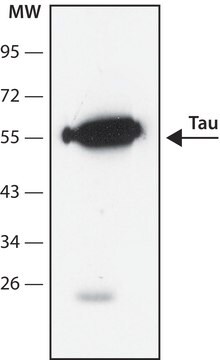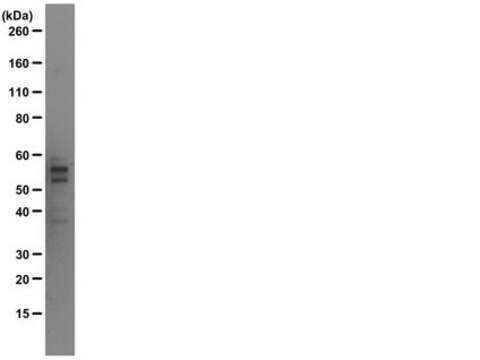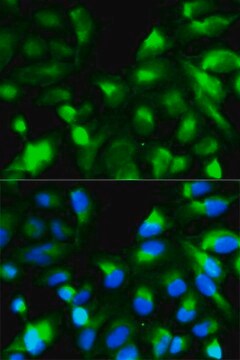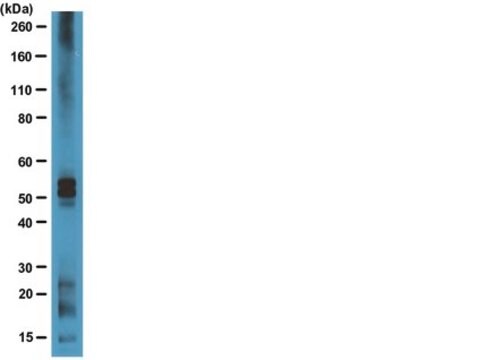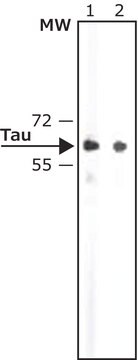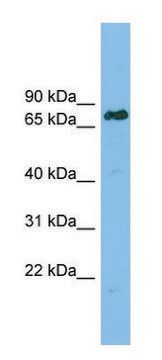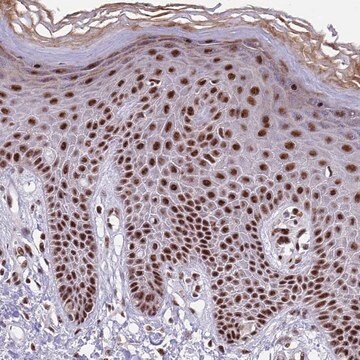MABN471
Anti-Tau Antibody, PAD, clone TNT-1
clone TNT-1, from mouse
Synonym(e):
Microtubule-associated protein tau, Neurofibrillary tangle protein, Paired helical filament-tau, PHF-tau, Tau
About This Item
Empfohlene Produkte
Biologische Quelle
mouse
Qualitätsniveau
Antikörperform
purified antibody
Antikörper-Produkttyp
primary antibodies
Klon
TNT-1, monoclonal
Speziesreaktivität
mouse, rat, human
Methode(n)
ELISA: suitable
dot blot: suitable
immunofluorescence: suitable
immunohistochemistry: suitable
western blot: suitable
Isotyp
IgG1κ
NCBI-Hinterlegungsnummer
UniProt-Hinterlegungsnummer
Versandbedingung
wet ice
Posttranslationale Modifikation Target
unmodified
Angaben zum Gen
human ... MAPT(4137)
mouse ... Mapt(17762)
rat ... Mapt(29477)
Allgemeine Beschreibung
Immunogen
Anwendung
Neurowissenschaft
Neurodegenerative Krankheiten
Immunohistochemistry Analysis: A 1:2,000 dilution from a representative lot detected Tau, PAD in human Alzheimer′s brain tissue.
Immunohistochemistry Analysis: A representative lot from an independent laboratory detected Tau, PAD in normal and Alzheimer′s tissues from entorhinal cortex, hippocampus, inferior temporal gyrus, and superior gyrus of control (Kanaan, N. M., et al. (2011). J Neurosci. 31(27):9858-9868.).
ELISA Analysis: A representative lot from an independent laboratory detected Tau, PAD in recombinant Tau protein (Kanaan, N. M., et al. (2011). J Neurosci. 31(27):9858-9868.).
Qualität
Western Blot Analysis: 1 µg/mL of this antibody detected Tau, PAD in 10 µg of rat cortex tissue lysate.
Zielbeschreibung
Verlinkung
Physikalische Form
Lagerung und Haltbarkeit
Hinweis zur Analyse
rat cortex tissue lysate
Sonstige Hinweise
Haftungsausschluss
Not finding the right product?
Try our Produkt-Auswahlhilfe.
Lagerklassenschlüssel
12 - Non Combustible Liquids
WGK
WGK 1
Flammpunkt (°F)
Not applicable
Flammpunkt (°C)
Not applicable
Analysenzertifikate (COA)
Suchen Sie nach Analysenzertifikate (COA), indem Sie die Lot-/Chargennummer des Produkts eingeben. Lot- und Chargennummern sind auf dem Produktetikett hinter den Wörtern ‘Lot’ oder ‘Batch’ (Lot oder Charge) zu finden.
Besitzen Sie dieses Produkt bereits?
In der Dokumentenbibliothek finden Sie die Dokumentation zu den Produkten, die Sie kürzlich erworben haben.
Unser Team von Wissenschaftlern verfügt über Erfahrung in allen Forschungsbereichen einschließlich Life Science, Materialwissenschaften, chemischer Synthese, Chromatographie, Analytik und vielen mehr..
Setzen Sie sich mit dem technischen Dienst in Verbindung.

